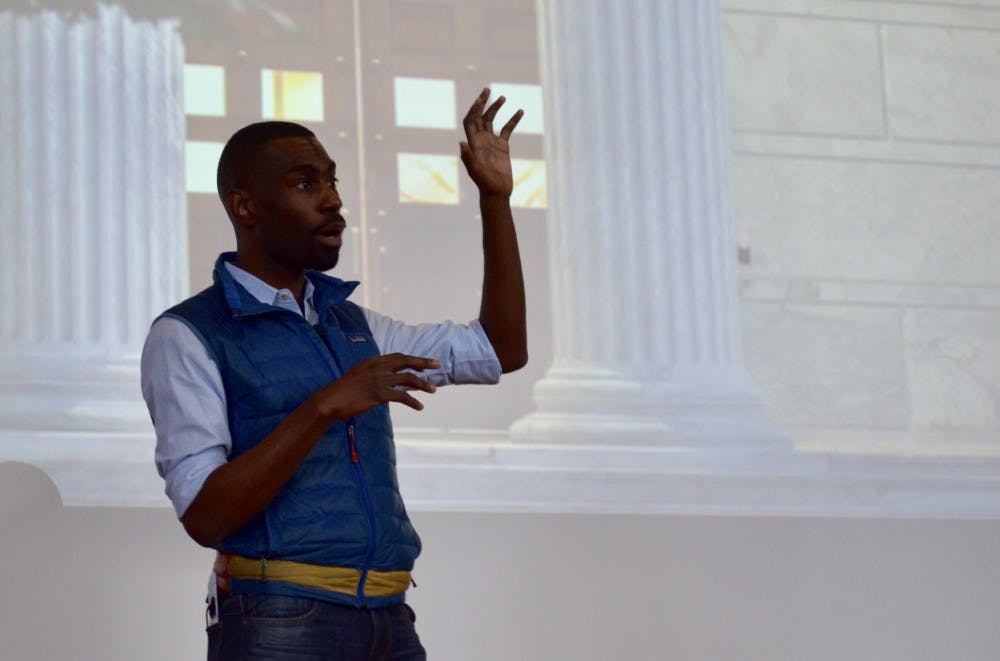“The work of justice is almost always the work of equity,” said DeRay Mckesson, a prominent activist in the Black Lives Matter movement. “Equality is the idea that everybody gets the same thing. Equity is the notion that people get what they need and deserve.”
Mckesson, sporting his famed blue Patagonia vest, took the stage after an introduction from Justin Wittekind ’21 and Assistant Dean of Undergraduate Students and Manager of Strategic Communications Bryant Blount.
After introducing himself, Mckesson slipped his notes into his pocket and delivered the rest of his impassioned talk from the center of the stage without cues or pictures. His manner captivated the room of students and community members.
In recent years, Mckesson has been at the forefront of Black Lives Matter activism and resistance movements, both on the streets and in political discourse. In 2015, Mckesson was named one of the World’s 50 Greatest World Leaders by Fortune magazine.
In his talk, Mckesson described the nuances of race relations in the United States and the structural inequalities that advance these injustices.
Mckesson explained that there were no official statistics for police shootings and that the numbers in use were only rough aggregates from local media.
“If the newspaper doesn’t write about you, you literally are not in the data set,” Mckesson said of police shooting statistics. He described some of the protections in place for police, such as Sacramento’s rule that any piece of discipline an officer receives is erased from the the officer’s record after a year.
Besides overt aggressions such as police violence toward black people in the United States, Mckesson emphasized other kinds of oppression they experience.

“There’s all this quiet trauma that’s ruining people’s lives every single day,” Mckesson explained. “It’s the not-sexy stuff.”
Mckesson relayed extensive knowledge about biased state and local laws, including the elimination of parole in Virginia for crimes after 1994 and the Oregon rule that anyone 15 or older be charged for felonies as adults. Mckesson said that these institutional structures are choices that disproportionately target people of color.
“This isn’t set up for us to win,” he said.
Throughout the lecture, Mckesson stressed the necessity of correcting widespread cultural conceptions of race beyond just fixing the lack of diversity. He argued that “the ideology of oppression will never undo oppression,” as making positive steps requires a fundamental restructuring of the way that race and privilege are understood in society.

“Whiteness shows up in ways that are not just enslavement and lynching,” he explained. White privilege, Mckesson said, is embedded in U.S. history, in institutional designs, in policy, and in the workforce.
“We gave white people wealth,” he argued, explaining a series of U.S. policies set up to give white people in the United States an advantage in areas such as home ownership and education. He went on to describe how society ignores this historical phenomenon. He explained that any similar suggestion of distribution among black U.S. residents is met with the response that black people “have to earn it” instead.
This challenge is further entrenched by what Mckesson views as a reluctance to radically reform the institutions that are the foundations for society, even in the spaces filled with activists.
Mckesson explained that he sees people in the activism movement in three “buckets”: “Salt shakers,” “sugar-high chasers,” and “bridge builders.” The first two, Mckesson said, are not as effective as the third. He explained that salt shakers are pessimistic about progress and sugar-high chasers are simply active protesters.
Surprisingly few people truly embody what Mckesson called “bridge builders,” or the people who recognize an opportunity for change and “find a way out of no-way.” This role, especially as it pertains to Black Lives Matter, is “more important than it is popular.”
When asked about his experience being at the forefront of the movement, Mckesson said that it comes with many challenges.
“I’m not a person anymore: I’m a symbol, and people can beat up a symbol,” he said.
Mckesson explained that he isn’t deterred by death threats and criticism, and he is constantly looking for ways to use his social power and media attention as platforms for bridging the ideological racial divide. Mckesson said that he is trying to give a voice to the oppressed regardless of the discomfort.
“Freedom is not only the absence of oppression, but the presence of justice and joy,” he said.
After Mckesson finished the allotted time for questions, he stayed at the front of the room talking to individuals until he was ushered away a half hour later.
Mckesson’s talk took place in McCosh Hall 10 on March 31 at 4:30 p.m. The event was sponsored by The American Whig-Cliosophic Society and the Office of the Dean of Undergraduate Students..








